初中英语语法之形容词、副词
- 格式:doc
- 大小:60.00 KB
- 文档页数:5
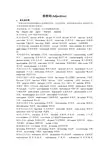
形容词(Adjectives)I.定义及分类形容词是用来说明或描述人或事物的性质、状态等的词。
就其构成形式而言,形容词可以分为单词形容词和复合形容词。
单词形容词:由一个词构成,可以带前缀或者后缀。
big diligent pale square dishonest impatient复合形容词:由两个或更多的词构成。
名词+形容词:sea-sick 晕船的air-sick 晕飞机的ice-cold 冰冷的duty-free 免税的snow-white 雪白的blood-thirsty 残忍的world-wide 世界性的shake-proof 防震的water-tight 不漏水的knee-deep 及膝的toll-free 免利息的top-heavy 头重脚轻的名词+名词-ed:iron-willed 意志坚强的ox-eyed 大眼睛的honey-mouthed 甜言蜜语的apple-shaped 苹果形状的lion-hearted 勇敢的silver-haired 银发的hook-nosed 勾鼻子的名词+现在分词:law-abiding 守法的time-consuming 耗费时间的self-sacrificing 自我牺牲的peace-loving 爱好和平的face-saving 顾面子的English-speaking 讲英语的pleasure-seeking 寻欢作乐的heart-rending 令人心碎的soul-stirring 感人肺腑的epoch-making 划时代的man-eating 吃人的fault-finding 喜欢挑剔的labor-saving 节省劳力的mouth-watering 令人垂涎的名词+过去分词:weather-beaten 饱经风霜的heart-felt 衷心的heart-broken 伤心的hand-made 手工的home-made 本国造的state-owned 国有的sugar-coated 糖衣的tongue-tied 结结巴巴的形容词(数词)+名词:long-distance 长途的fine-manner 举止优雅的present-day 当前的five-year 五年的bare-foot 赤脚的first-rate 一流的second-rate 二流的first-class 头等的deep-sea 深海的half-price 半价的one-way 单向(通行)的part-time 兼职的形容词(数词)+名词-ed:white-haired 白发的round-faced 圆脸的double-faced 两面派的teen-aged 十几岁的good-mannered 有礼貌的bad-tempered 坏脾气的narrow-minded 心胸狭窄的noble-minded 品格高尚的kind-hearted 心地善良的absent-minded 心不在焉的smooth-tongued 花言巧语的short-sighted目光短浅的near-sighted 近视的simple-minded 头脑简单的tight-fisted 吝啬的far-sighted 眼光远大的warm-hearted 热心的形容词+现在分词:good-looking 好看的sweet-smelling 好闻的easy-going 随和的thorough-going 彻底的fine-sounding 好听的形容词+过去分词:high-born 出身高贵的ready-made 现成的ready-cooked 烧好的native-born 本地生的new-built 重建的副词+形容词:ever-green 常青的all-round 全能的,全面的over-busy 太忙的over-credulous 过于轻信的over-critical 过于挑剔的(=hypercritical)副词+名词:off-hour 休息时间的off-guard 失去警惕的off-campus 校园外的off-key 不协调的off-budget 预算外的on-line 在线的副词+现在分词:ever-lasting 持久的on-coming 迎面而来的up-coming 即将来临的well-meaning 善意的far-reaching 深远的ever-increasing 不断增加的never-ending 不断的high-ranking 高级的副词+过去分词:well-known 著名的ill-mannered 举止粗鲁的well-behaved 表现好的well-informed 消息灵通的well-balanced 平衡的well-dressed 穿着时髦的badly-wounded 重伤的wide-spread 广泛流传的newly-built 新建的widely-used 广泛使用的well-equipped 装备精良的newly-married 新婚的形容词+形容词:red-hot 炽热的dark-green 深绿的bloody-red 血红的过去分词+介词:unthought-of 没有想到的unpaid-for 没付款的undreamed-of 连做梦也没想到的longed-for 渴望的uncalled-for 未被请求的unlooked-for 非期待的most-talked-about 谈得最多的yet-unheard-of 尚未听说过的(unheard-of=unprecedented)动词(过去分词)+副词:carry-on 随身携带的built-in 嵌入的cast-off 丢弃的drive-in 开车进去的unlived-in 没人住的其他类型:heart-to-heart 推心置腹的well-to-do 富裕的well-off 富裕的down-to-earth 讲究实际的life-and-death 生死攸关的根据其句法功能可以分为定语形容词,表语形容词和通用形容词:定语形容词:1. 起强调作用或特指作用的形容词: actual age chief cause main idea mere child only reason principal food sheer nonsense sole purpose total number2. 由名词转化而来的形容词:atomic energy, criminal law golden opportunity medical college表语形容词:1. 某些以a-开头的形容词: afraid alert alike alive alone aloof ashamed asleep astir awake aware2. 表示健康状况的形容词: faint ill well unwell注:ill作定语时,意为“坏的,邪恶的,恶劣的”如:ill luck/name/news/temper/wound等。
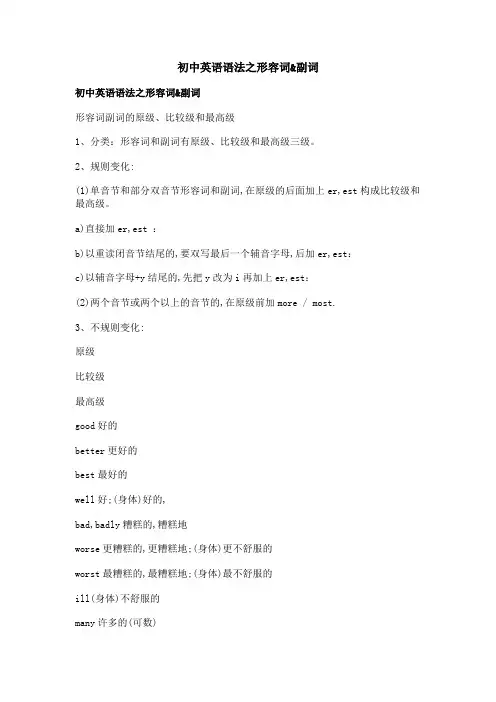
初中英语语法之形容词&副词初中英语语法之形容词&副词形容词副词的原级、比较级和最高级1、分类:形容词和副词有原级、比较级和最高级三级。
2、规则变化:(1)单音节和部分双音节形容词和副词,在原级的后面加上er,est构成比较级和最高级。
a)直接加er,est :b)以重读闭音节结尾的,要双写最后一个辅音字母,后加er,est:c)以辅音字母+y结尾的,先把y改为i再加上er,est:(2)两个音节或两个以上的音节的,在原级前加more / most.3、不规则变化:原级比较级最高级good好的better更好的best最好的well好;(身体)好的,bad,badly糟糕的,糟糕地worse更糟糕的,更糟糕地;(身体)更不舒服的worst最糟糕的,最糟糕地;(身体)最不舒服的ill(身体)不舒服的many许多的(可数)more更多的;更most最多的;最much许多的(不可数);非常little少的less更少的least最少的far远的;远地farther更远的;更远地farthest最远的;最远地further进一步的(地)furthest最深刻的(地)4、形容词和副词的原级、比较级和最高级的用法:(1) 讲述某人/物自身的情况时,用原级。
基本句型是:主语(sb./sth) + 谓语动词+(very/too/so/quite/rather…) + 形容词/副词原级+….如:He is very oldnow. 他现在很老了。
They ran quitefast. 它们跑得相当快。
The weatherlooks rather bad. 天气看上去相当糟。
I am sohappy! 我是如此的快乐!☆表示两者之间没有差别时,使用句型:主语(第一个人物) + 谓语动词 + as + 形容词/副词原级 + as + 第二个人物+….如He is as excited as his younger sister. 他和他妹妹一样兴奋。
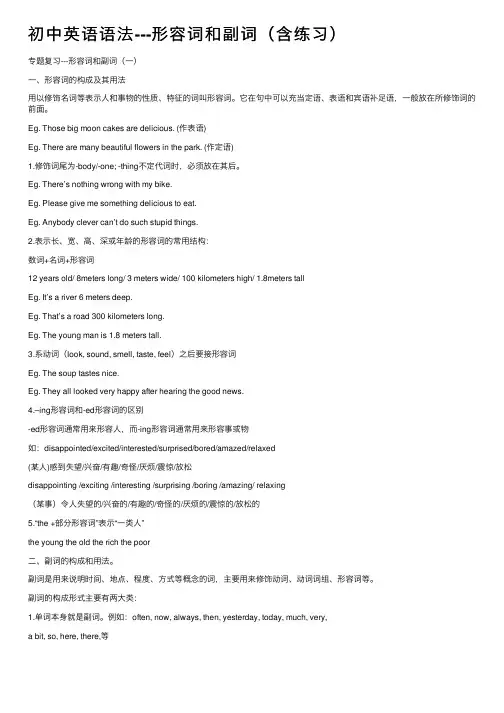
初中英语语法---形容词和副词(含练习)专题复习---形容词和副词(⼀)⼀、形容词的构成及其⽤法⽤以修饰名词等表⽰⼈和事物的性质、特征的词叫形容词。
它在句中可以充当定语、表语和宾语补⾜语,⼀般放在所修饰词的前⾯。
Eg. Those big moon cakes are delicious. (作表语)Eg. There are many beautiful flowers in the park. (作定语)1.修饰词尾为-body/-one; -thing不定代词时,必须放在其后。
Eg. There’s nothing wrong with my bike.Eg. Please give me something delicious to eat.Eg. Anybody clever can’t do such stupid things.2.表⽰长、宽、⾼、深或年龄的形容词的常⽤结构:数词+名词+形容词12 years old/ 8meters long/ 3 meters wide/ 100 kilometers high/ 1.8meters tallEg. It’s a river 6 meters deep.Eg. That’s a road 300 kilometers long.Eg. The young man is 1.8 meters tall.3.系动词(look, sound, smell, taste, feel)之后要接形容词Eg. The soup tastes nice.Eg. They all looked very happy after hearing the good news.4.–ing形容词和-ed形容词的区别-ed形容词通常⽤来形容⼈,⽽-ing形容词通常⽤来形容事或物如:disappointed/excited/interested/surprised/bored/amazed/relaxed(某⼈)感到失望/兴奋/有趣/奇怪/厌烦/震惊/放松disappointing /exciting /interesting /surprising /boring /amazing/ relaxing(某事)令⼈失望的/兴奋的/有趣的/奇怪的/厌烦的/震惊的/放松的5.“the +部分形容词”表⽰“⼀类⼈”the young the old the rich the poor⼆、副词的构成和⽤法。

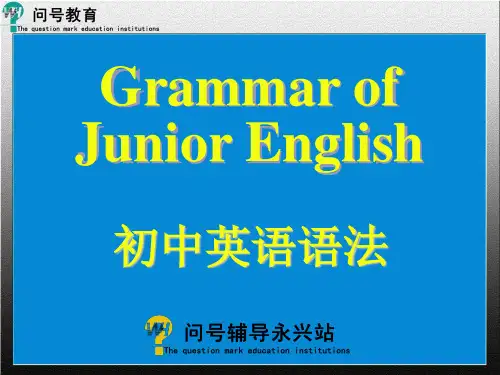
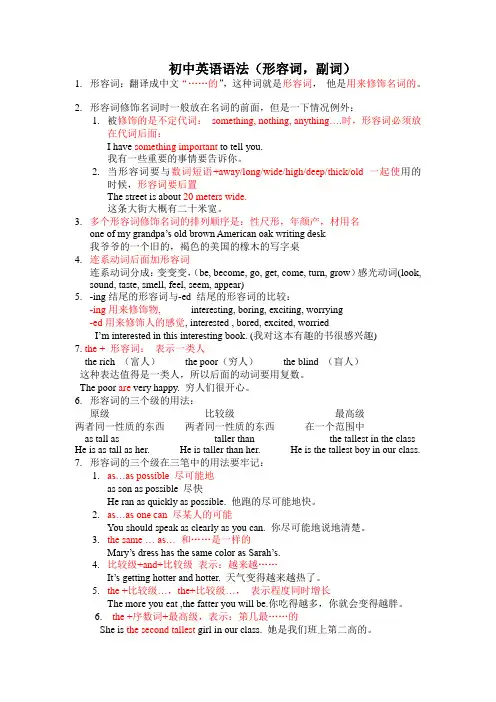
初中英语语法(形容词,副词)1.形容词:翻译成中文“……的”,这种词就是形容词,他是用来修饰名词的。
2.形容词修饰名词时一般放在名词的前面,但是一下情况例外:1.被修饰的是不定代词:something, nothing, anything….时,形容词必须放在代词后面:I have something important to tell you.我有一些重要的事情要告诉你。
2.当形容词要与数词短语+away/long/wide/high/deep/thick/old 一起使用的时候,形容词要后置The street is about 20 meters wide.这条大街大概有二十米宽。
3.多个形容词修饰名词的排列顺序是:性尺形,年颜产,材用名one of my grandpa’s old brown American oak writing desk我爷爷的一个旧的,褐色的美国的橡木的写字桌4.连系动词后面加形容词连系动词分成:变变变,(be, become, go, get, come, turn, grow)感光动词(look, sound, taste, smell, feel, seem, appear)5.-ing结尾的形容词与-ed 结尾的形容词的比较:-ing用来修饰物,interesting, boring, exciting, worrying-ed用来修饰人的感觉, interested , bored, excited, worriedI’m interested in this interesting book. (我对这本有趣的书很感兴趣)7. the + 形容词:表示一类人the rich (富人)the poor(穷人)the blind (盲人)这种表达值得是一类人,所以后面的动词要用复数。
The poor are very happy. 穷人们很开心。
6.形容词的三个级的用法:原级比较级最高级两者同一性质的东西两者同一性质的东西在一个范围中as tall as taller than the tallest in the class He is as tall as her. He is taller than her. He is the tallest boy in our class.7.形容词的三个级在三笔中的用法要牢记:1.as…as possible 尽可能地as son as possible 尽快He ran as quickly as possible. 他跑的尽可能地快。
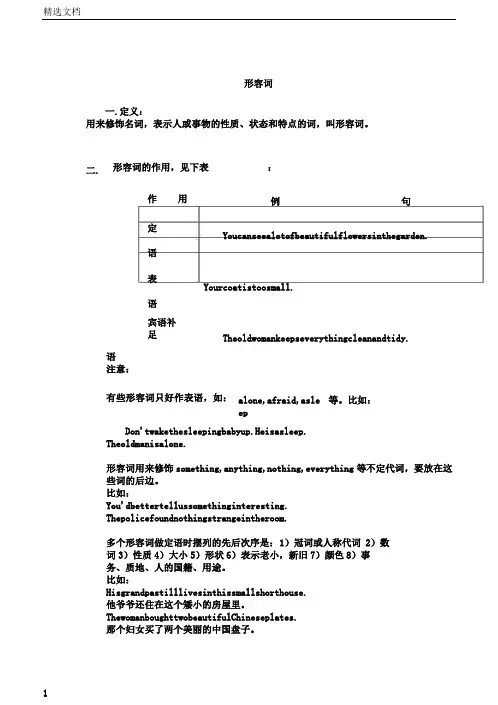
形容词一.定义:用来修饰名词,表示人或事物的性质、状态和特点的词,叫形容词。
二.形容词的作用,见下表:作用例句定Youcanseealotofbeautifulflowersinthegarden.语表Yourcoatistoosmall.语宾语补足Theoldwomankeepseverythingcleanandtidy.语注意:有些形容词只好作表语,如:alone,afraid,asle等。
比如:epDon'twakethesleepingbabyup.Heisasleep.Theoldmanisalone.形容词用来修饰something,anything,nothing,everything等不定代词,要放在这些词的后边。
比如:You'dbettertellussomethinginteresting.Thepolicefoundnothingstrangeintheroom.多个形容词做定语时摆列的先后次序是:1)冠词或人称代词 2)数词3)性质4)大小5)形状6)表示老小,新旧7)颜色8)事务、质地、人的国籍、用途。
比如:Hisgrandpastilllivesinthissmallshorthouse.他爷爷还住在这个矮小的房屋里。
ThewomanboughttwobeautifulChineseplates.那个妇女买了两个美丽的中国盘子。
形容词名词化:有些形容词前加定冠词后变为名词,表示一类人,谓语常用复数。
这种词有:rich/poor;good/bad;young/old;healthy/ill;living/dead;black/white(表示人种等)。
比如:Theyoungshouldtakegoodcareoftheold.年青人应当好好照料老人。
Therichneverhelpthepoorinthiscountry.在这个国家,富人素来不帮助穷人。
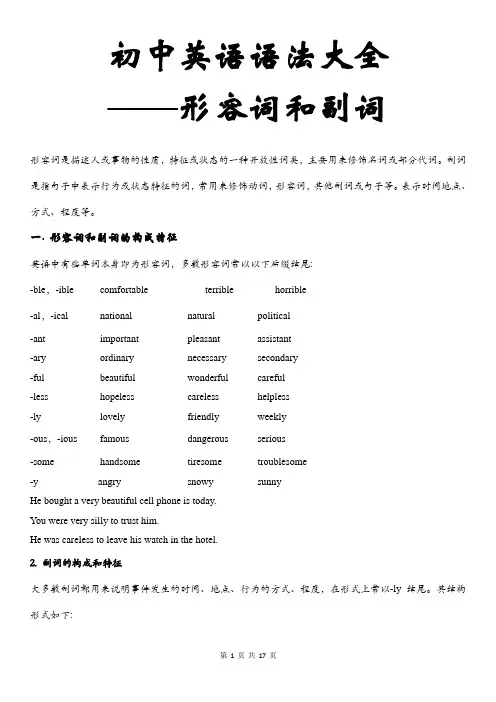
初中英语语法大全——形容词和副词形容词是描述人或事物的性质,特征或状态的一种开放性词类,主要用来修饰名词或部分代词。
副词是指句子中表示行为或状态特征的词,常用来修饰动词,形容词,其他副词或句子等。
表示时间地点、方式、程度等。
一. 形容词和副词的构成特征英语中有些单词本身即为形容词,多数形容词常以以下后缀结尾:-ble,-ible comfortable terrible horrible-al,-ical national natural political-ant important pleasant assistant-ary ordinary necessary secondary-ful beautiful wonderful careful-less hopeless careless helpless-ly lovely friendly weekly-ous,-ious famous dangerous serious-some handsome tiresome troublesome-y angry snowy sunnyHe bought a very beautiful cell phone is today.You were very silly to trust him.He was careless to leave his watch in the hotel.2. 副词的构成和特征大多数副词都用来说明事件发生的时间、地点、行为的方式、程度,在形式上常以-ly结尾。
其结构形式如下:The detective carefully observed everything in the room.He will completely finish his work by the end of this month.Such things will easily happen.二. 形容词和副词的种类1. 形容词的种类(1) 根据其结构形式分类,形容词可以分为简单形容词和合成形容词两类。


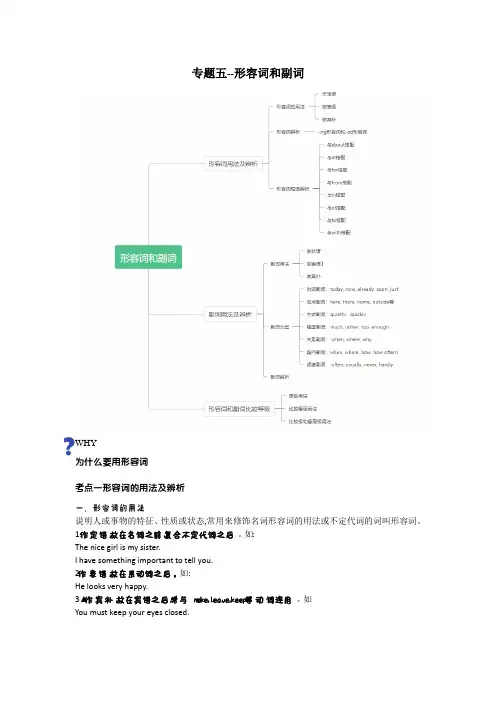
专题五--形容词和副词WHY为什么要用形容词考点一形容词的用法及辨析一、形容词的用法说明人或事物的特征、性质或状态,常用来修饰名词形容词的用法或不定代词的词叫形容词。
1.作定语,放在名词之前,复合不定代词之后。
如:The nice girl is my sister.I have something important to tell you.2作表语,放在系动词之后。
如:He looks very happy.3▲作宾补,放在宾语之后,常与m a ke, leave,keep等动词连用。
如You must keep your eyes closed.二、形容词辨析1.-ing 形容词和-ed形容词2.区别是什么:▲-ing用来表示一个人,一个物或者一种情景的特征▲-ed用来形容人的感觉或者情感比较:My girlfriend is bored.My girlfriend is boring.-ing形容词修饰物-ed形容词修饰物例句Surprising Surprised This is a surprising story.I am surprised at the news.interesting interested I read an interesting book last week.Are you interested in watching football games?exciting Excited Lucy told me that she had an exciting journy this summer holiday.I’m excited about the traveling.pleasing pleased This is a pleasing trip.Mr. Smith is pleased with our performance.frightening frightened We were told a frightening story last night.we are frightened of the ghost.moving moved Titanic is a moving film.All the people were deeply moved by the love of Jack and Rose. tiring tired It’s a long tiring day.I’m too tired to go out again.fascinating Fascinated What a fascinating voice!Many boys are fascinated by computer games.Amusing Amused He likes to surround himself with amusing people.We were all amused at his stories.Disappointing Disappointed If you do, you’ll only be disappointed.It was disappointing to lose the game.Worrying Worried We are worried about you.Her sisuation is worring.3.多个形容词修饰同一个名词时的顺序-描绘形容词—大小(长短高低)形容词—形状形容词—年龄(新旧)形容词—颜色形容词—国籍形容词—材料形容词—用途(类别)形容词—名词I bought a nice(好看的) small(小小的) round(圆形的) new(新的) yellow(黄色的) French (法国产的) oak(橡木做的) writing desk.太长了.....我们常用的是这样的↓↓:an old Chinese stone bridgesome beautiful little red flowers但如果确实要用这么多定语来修饰这个writing desk的话可以怎么做呢?如何辨别哪些是形容词呢:通常来讲如下后缀结尾的词为形容词:-al, -ial, -ical:national, essential, criticial,special, social,central, general-able, -ible:vuable, edible,unable, suitable, reasonable,possible, responsible-an, -ian:American, Roman,Australian-full:meaninful, faithful, beautiful-ic:energetic,public,academic, fantastic, dramatic-ical:biological, chemical, logical,medical,musical, physical,-ive:active,creative, commutative,decisive, effective-ish:foolish, selfish, childish,girlish, yellowish-less:meaningless, endless, useless,helpless,colorless-y:easy, ready,dry, cloudy, sunny, rainy,snowy-ous, -ose: various, famous,curious,dangerous-ant, -ent:important, brriliant,dominant, distant,diffrent, present, recent-ile:4.形容词短语辨析在英语中有很多形容词后需要加特定的介词构成形容词短语,常见的有: (1)与a bout搭配be careful about对……小心be sure about对…有把握be crazy about对…热衷be curious about对……好奇be worried about对…担忧be anxious about对感到焦虑be sorry about对…感到遗憾be strict about sth.对某事要求严格(2)与a t搭配be amused at以为乐be annoyed at对…恼怒be surprised at对感到惊奇be angry at对生气be good at在…方面擅长的用(与期词(3)与f or搭配be famous for因…而著名get ready for做好准备be sorry for感到抱歉be fit/unfit for适合/不适合be good for对有好处be bad for对…有坏处be suitable for适合be thirsty for渴望(4)与f rom搭配be absent from缺席be different from与不同be separated from和…分离开(5)与in搭配be interested in对……感兴趣be weak in在...方面薄弱be different in在…方面不同be successful in在…方面成功(6)与搭配be afraid of害怕be fond of喜欢be proud of为感到自豪be tired of对…感到厌倦be full of充满be careful of对…小心be short of…短缺be ashamed of对…感到羞愧(7)与t o搭配be close to接近,靠近be good to对…好be kind to对和蔼be rude to对……粗鲁be polite to对……有礼貌be useful to对……有用be related to与……有关be similar to与……相似(8)与w ith搭配be angry with对……生气be careful with小心be busy with忙于be filled with充满be related to与有be similar to与相似(8)与w ith搭配be angry with对……气be careful with小心be busy with忙于be filled with充满be satisfied with对……感到满意be pleased with对……感到满意be patient with对……有耐心be strict with sb.对某人要求严格WHY什么是副词?为什么要使用副词?Even after one year of lessons, Luke plays the piano badly.He's always in a rush. I don't understand why he walks so quicklyMichael happily took the assistant job. He had been looking for a position all summer.以上表示how,怎么样,以什么方式I couldn’t find the car keys inside your purse.The lift is moving up.-Where is Lucy? I haven’t seen for a while.-She is/went abroad.Wendy threw the garbage out, but the flies would not leave.以上表示where,在哪里I didn’t go to the museum yesteday.Charlie, can you wait me for a second? I’ll be back soon.I have already finished the project.The recently found Wallace was so lost that he just wandered aimlessly in circles.以上表示when,在什么时候。
初中英语语法大全:形容词和副词A:形容词1、形容词及其用法形容词修饰名词,说明事物或人的性质或特征。
通常,可将形容词分成性质形容词和叙述形容词两类,其位置不一定都放在名词前面。
1) 直接说明事物的性质或特征的形容词是性质形容词,它有级的变化,可以用程度副词修饰,在句中可作定语、表语和补语。
例如:hot 热的。
2) 叙述形容词只能作表语,所以又称为表语形容词。
这类形容词没有级的变化,也不可用程度副词修饰。
大多数以a开头的形容词都属于这一类。
例如:afraid 害怕的。
(错)He is an ill man.(对)The man is ill.(错)She is an afraid girl.(对)The girl is afraid.这类词还有: well,unwell,ill,faint,afraid,alike,alive,alone,asleep,awake 等。
3)形容词作定语修饰名词时,要放在名词的前边。
但是如果形容词修饰以-thing 为字尾的词语时,要放在这些词之后,例如:something nice2. 以-ly结尾的形容词1)大部分形容词加-ly可构成副词。
但 friendly,deadly,lovely,lonely,likely,lively, ugly,brotherly,仍为形容词。
改错:(错) She sang lovely.(错) He spoke to me very friendly.(对) Her singing was lovely.(对) He spoke to me in a very friendly way.2)有些以-ly 结尾既为形容词,也为副词。
daily,weekly,monthly,yearly,earlyThe Times is a daily paper.The Times is published daily.3 用形容词表示类别和整体1)某些形容词加上定冠词可以泛指一类人,与谓语动词的复数连接。
语法专题-形容词与副词一、形容词和副词的构成1.合成形容词的构成单个形容词的构成比较复杂,考生要熟记常见的形容词的后缀(如:-able, -al, -en ,-ful, -ish, -ous -y, -ly等等)。
而合成形容词是有规律可循的。
规则例词规则例词形容词+名词-ed kind-hearted 名词+形容词world-famous 形容词+形容词dark-blue 名词+现在分词peace-loving形容词+现在分词ordinary-looking 名词+过去分词snow-covered形容词(副词)+形容词wide-awake 名词+(普通)名词English-language 副词+现在分词hard-working 数词+名词-ed three-egged 副词+过去分词newly-built 数词+名词twenty-year2.副词的构成规则例词在形容词后加―ly‖entirely curiously exactly fortunately attentively immediately将形容词的词尾―le‖变―ly‖comfortable—comfortably gentle—gently possible—possibly probable—probably词尾―y‖变―i+ly‖busy—busily easy—easily heavy—heavily angry—angrilyhungry—hungrily lucky—luckily happy—happily特殊词true—truly二、形容词和副词的功能1.形容词的功能功能举例定语He has never seen such a more interesting film.他从来没有看过这么有趣的电影。
表语I’m fine, but tired.我身体很好,但很累。
★(1)连系动词+adj. 连系动词:①be动词②感官动词(look; smell; feel; touch; taste; sound)③“变化”型:(become; turn; go; get…)④―保持‖型:(keep /remain/stay…)★(2)It’s+adj.+(for/of sb.)+to do sth. ★(3)so+adj.+that句子“如此…以至…”★(4)too+adj.+to do sth.★(5)形容词/副词+enough The weather i s getti ng warmer and warmer.天气变得越来越暖和。
初中英语语法---形容词和副词用法讲解命题趋势:形容词的比较级是近几年中考命题的热点之一,占中考题的百分之九以上,近几年中考试题主要考查形容词在句中作表语,后置定语和宾语补足语的用法。
比较级的一些不规律的情况及一些固定句型也尤为重要,比较级和最高级在特定的语言环境中的选用也是重点考查内容。
考点一、形容词的定义及句法功能形容词是用来描写或修饰名词(或代词)的一类词。
形容词在句中主要用作定语、表语和宾语补足语。
1.用作定语,修饰名词或代词。
(1)形容词修饰名词时,一般置于它所修饰的名词之前;如有若干形容词同时修饰一个名词时,它们的排列顺序较为固定,通常为:描绘形容词—特征形容词--(包括大小、长短、形状、新旧、年龄等)--颜色形容词。
例如:She has beautiful long curly blond hair.她长着漂亮的金黄色长卷发。
Mary gave me a useful big brown wooden box.玛丽给我一个实用的大的褐色木盒子。
注意:A.enough修饰名词时,既可以放在名词之前,也可以放在名词之后。
但多放在名词前。
例如:Don’t worry, we have enough time/time enough to get there.别着急,我们有足够的时间赶到那儿。
B.由连字符连接起来的复合形容词中的名词只能用单数形式。
例如:an eight-year-old boy 一个8岁的男孩(2)形容词修饰由some,any,every,no等构成的复合不定代词时,需后置。
例如:Will you please tell us something interesting?你给我们说一些有趣的事好吗?There’s nothing special in the box.盒子里没有什么特别的东西。
Anyone intelligent can do it.任何有智力的人都能做这件事。
2013年实验中学初三英语复习学案萧东来2013-04初中英语语法之形容词、副词形容词:一、形容词的一般用法1.作定语,一般放在所修饰词的前面。
例如,It’s a cold and windy day.2.作表语,放在系动词的后面。
例如,He looks happy today.3.形容词修饰something,anything,nothing,everything 等复合不定代词时,须放在其后。
例如,Would you like something hot to drink?4.表示长、宽、高、深及年龄的形容词,应放在相应的名词之后。
例如,How long is the river?It’s about two hundred kilometers long.5.只能作表语的形容词:afraid 害怕;alone 独自的;asleep 睡着的;awake 醒着的;alive 活着的;well 健康的;ill 病的;frightened 害怕的例如,The man is ill.(正) The ill man is my uncle.(误)6.只能作定语的形容词:little 小的;only 唯一的;wooden 木质的;woolen 羊毛质的;elder 年长的例如,My elder brother is in Beijing. (正) My brother is elder. (误)7.貌似副词的形容词:lonely 独自的;friendly 友好的;lively 生动的;lovely 可爱的8.复合形容词:snow-white 雪白的English-speaking 说英语的;full-time 全日制的;well-known众所周知的;kind-hearted 善良的;man-made 人造的;take-away 可以带走的;ten-year-old 十岁的。
二、多个形容词修饰名词时,其顺序为:限定词(冠词、指示代词、形容词性物主代词、数词) ——描绘词(大小,长短,形状,新旧,长幼,颜色)——出处——材料性质——类别——名词(此项不要求掌握)A small round table 一张小圆桌A tall white building 一幢高大的白色建筑物A dirty old black shirt 一件又脏又旧的黑色衬衣A famous American medical school 一个非常著名的美国医学院三、形容词常用句型1.“It’s +adj.+of+sb.+不定式”表示“某人(做某事)怎么样”。
注意:这一句型中常用描述行为者的性格、品质的形容词,good(好的),如kind(友善的),nice(友好的),polite(有礼貌的),clever(聪明的),foolish(愚蠢的),lazy(懒惰的),careful(细心的),careless(粗心的),right(正确的),wrong(错误的)等。
例如,It’s very kind of you to help me.(=You are very kind to help me.)你能帮助我,真好。
It’s very rude of her to say such words.(=She is very rude to say such words.)她说这样的话,真粗鲁。
It’s foolish of him to go alone.(=He is foolish to go alone.)他单独出去太傻了。
2.“It’s+adj.+for+sb.+不定式”表示“做某事对某人来说怎么样”。
注意:这一句型中常用的形容词有important(重要的),necessary(必要的),difficult(困难的),easy(容易的),hard(艰难的),dangerous(危险的),safe(安全的),useful(有益的),pleasant(舒适的),interesting(有趣的),impossible(不可能的)等。
例如It’s not easy for them to learn a foreign language.(=To learn a foreign language is no t easy for them.)对于他们来说学好一门外语不容易。
It’s very important for students to listen to teachers carefully.(=To listen to teachers carefully is very important for students.)对于学生来说上课认真听老师讲课是非常重要的。
It’s necessary for us to get to school on time. (=To get to school on time is necessary for us.)对于我们来说按时到校是非常必要的。
3. 表示感情或情绪的形容词,glad(高兴的),如pleased(高兴的),sad(忧伤的),thankful(感激的)等常接不定式。
例如,Glad to see you.见到你非常高兴。
I’m very sorry to hear the bad news.听到这个坏新闻,我非常难过。
4. 表示能力和意志的形容词,如ready(乐意的,有准备的),able(有能力的),sure(一定),等常接不定式。
例如,He is always ready to help others.他总是乐于助人。
四、一些形容词的用法辨析:⑴whole 与all:记住两个词序:①the whole + 名词;②all (of) the + 名词。
如:He was busy the whole morning.( 整个早晨他都很忙)He can remember all the words he learns.(他能记住学过的所有单词)⑵tall 与high, short 与low :指人的个子时用tall 与short;指其他事物时一般用high 与low。
如:He’s very tall/short.(他个子高/矮)Tall trees are standing on both sides of that avenue.(大道的两侧有高大的树木)A few people live on high mountains.(少量的人住在高山上)⑶real 与truereal 一般指东西的真假,译为“真的”;而true 则指事情或消息的可靠性,译为“真实的”。
如:This is a real diamond(钻石) and it’s very expensive.(这是货真价实的钻石,非常贵)--Is that true?—Yes. I heard it with my own ears (那真实吗?是的,我亲耳所听)⑷interested 与interesting 的区别:interesting 指事物本身“有趣”,而interested 指人对……感到“有趣”,一般说来,加-ing的形容词修饰“事物”,加-ed的形容词修饰“人”interesting使人感到高兴--interested感到高兴的exciting令人激动的--excited感到激动的boring令人厌烦的-- bored感到厌烦的disappointing令人失望的--disappointed感到失望的encouraging令人鼓舞的--encouraged感到鼓舞的pleasing令人愉快的--pleased感到愉快的satisfying令人满意的---satisfied感到满意的surprising令人惊异的--surprised感到惊异的worrying令人担心的--worried感到担心的embarrassing 令人尴尬的-- embarrassed 感到为难的frustrating令人沮丧的— frustrated感到沮丧的如:This book is interesting and you will be interested in it. (这本书很有趣,你会对它感兴趣的)⑸such,so 用法:such + a(an) + 名词(单数)(+that 从句)so + 形容词/副词+that 从句I have never seen such a foolish boy.(我从来没有见过这么蠢的男孩)He is so clever that he can work out the problem .(他这么聪明,会解出这道题)⑹good 与wellwell:表示“好”时,作状语用,放在行为动词之后Study well and make progress every day.(好好学习,天天向上)Well 还可以表示“(身体)好”—How are you? —I am very well. (你好吗?我很好。
)good 作定语或表语用如:Doing sports is good for us.(进行运动对我们有益)⑺nice与fine的区别:nice 表示令人愉快的,可以指东西、人物外表等,fine一般指身体或天气好。
如:Let’s go and share (分享) the nice cake. (我们去分享那块美味的蛋糕吧)She is a nice girl..(他是个漂亮的姑娘)What a fine day! (多好的天气!)He’s fine recently(最近).(近来他身体不错)⑻too much 与much tootoo much 表示“太多的”,修饰事物数量;much too 表示“太过分”, 修饰形容词或副词。
如:I am full because I have had too much rice. 我饱了,因为我吃了太多的米饭)That coat is much too dear .(那件大衣太贵了)⑼quick、fast 与soonquick 往往指反应速度快,fast 往往指动作快,而soon 则表示时间上很快即将发生。
如:After a quick breakfast, he hurried to school(匆匆地吃过早饭,他朝学校赶去)A train is much faster than a bus. (火车比公共汽车快得多)His father will be back soon.(他父亲很快就要返回中国)⑽lonely 与alonelonely 是表示心理活动的形容词,意思是:“孤独的,寂寞的”,作定语或表语;alone 的意思是:“独自的,单独的”,指无人陪伴,仅作表语,(作为副词的alone 可作状语)。